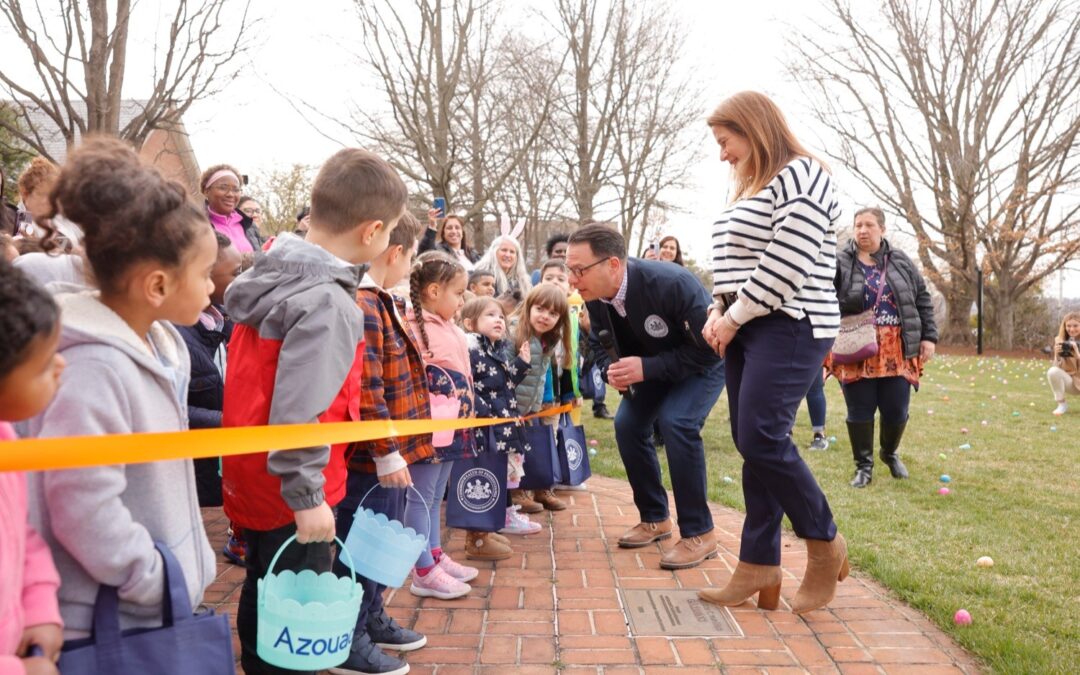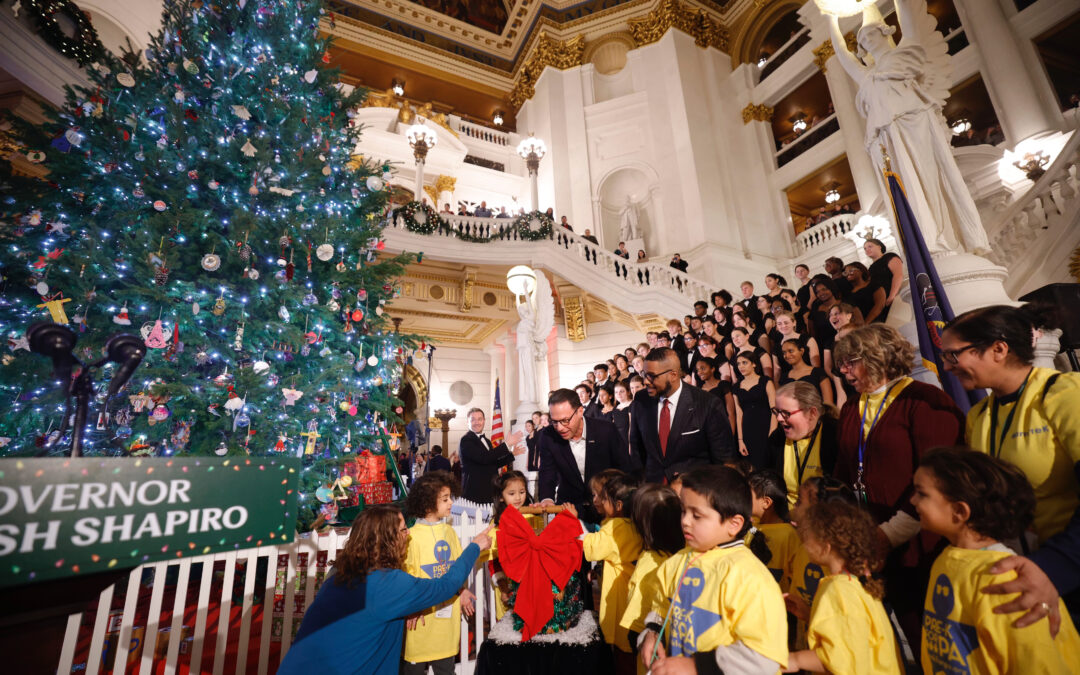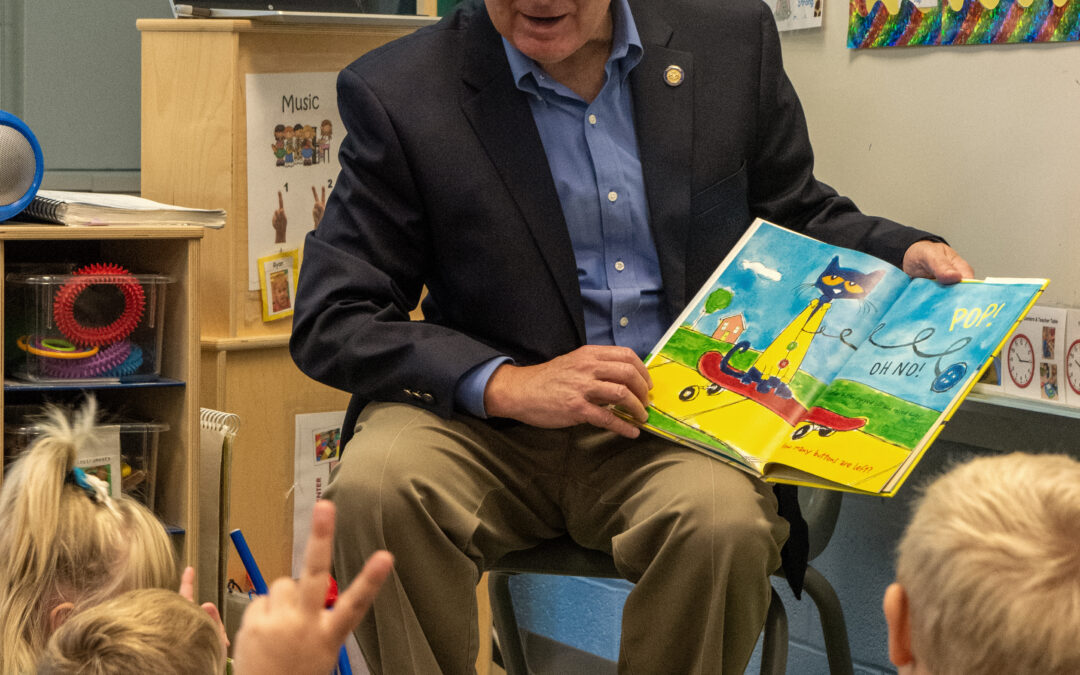
Harrisburg, PA (March 26, 2024) – Today, Governor Josh Shapiro and First Lady Lori Shapiro hosted high-quality pre-k classrooms from across the commonwealth at the annual Easter egg hunt at the Governor’s Residence. Preschool students from Montgomery County Intermediate Unit in Norristown, Summit Early Learning in Mifflinburg, and Touching the Future in Fleetwood were in attendance for the festivities.

MyChesCo: Shaping the Future of Pennsylvania: Examining Gov. Shapiro’s 2024-25 Budget Proposal
February 7, 2024
By: Maryann Pugh
Today, we delve into our analysis of the 2024-25 state budget proposed by Governor Josh Shapiro, an issue that is currently the focus of numerous discussions amongst Pennsylvanians and the Early Learning Pennsylvania (ELPA) coalition.
Gov. Shapiro’s budget proposal puts the spotlight on the young minds of our state, focusing significantly on pre-kindergarten programs and aiming to tackle the pressing matter of a historic teacher staffing shortage. With nearly $33 million allocated towards state-funded pre-K programs, the Governor’s office aims to alleviate inflationary pressures that pre-K providers grapple with while navigating the seemingly unending teacher shortage.
However, the ELPA coalition paints a concerning picture with pre-K classrooms closing throughout the commonwealth due to inadequate wages. These circumstances are forcing pre-k teachers to vacate their chosen field for higher-paying roles in other sectors. The fresh investment planned by the government is undoubtedly a critical initial step towards overcoming this issue.
While these initiatives are commendable, there’s a dire need for future investments to handle the teacher shortage and ensure the potential 87,000 eligible preschoolers in Pennsylvania receive the quality early education they need.
Another cornerstone of the proposed budget is increased rates for subsidized childcare, a move applauded by Start Strong PA. The hike in reimbursement rates aims primarily to support child care providers grappling with escalating costs and a worsening teacher shortage. States like Maine, Florida, Kentucky, and Nebraska have shown the way by investing in recruitment and retention programs to stabilize their child care systems, and Pennsylvania may need to follow suit.
The budget proposal also includes an increase in funding for Early Intervention programs, which work with children who have developmental delays. This funding is a crucial step in ensuring all children with developmental delays can receive the help they need, regardless of their family’s income.
However, the proposal has raised concerns among the Childhood Begins at Home campaign, which expressed worries about a potential cut in funding for home-visiting services due to the expected loss of one-time federal stimulus funds, and effects of federal sequestration on discretionary spending.
While Gov. Shapiro’s proposal outlines important advances in early childhood education and support, many advocacy campaigns believe further steps must be taken to fully address Pennsylvania’s child care and pre-K teacher shortage, and ensure the future generations of our state are afforded the quality early education they so rightly deserve.
Read the full article here.

PennLive: Oped: Get this Done – Pre-K for PA
January 26, 2024
By: Governor Rendell and Governor Schweiker
Few issues in Pennsylvania have united Republicans and Democrats over the years like the prospect of ensuring that our youngest learners are ready to succeed through high-quality pre-k programs like Pre-K Counts and Head Start. In fact, a September 2023 Susquehanna Polling and Research poll showed that 94% of PA voters believe that early learning is important, and 71% support increasing state funding to serve more eligible children in pre-K programs.
There is good reason for this support, research is clear that brain development from birth to age five sets the foundation for children’s future success. During these years, more than one million new neural connections form every second – more than any other time in life. This early foundation sets the stage for children’s cognitive ability, health, and behavior throughout life. Quality pre-kindergarten programs have been proven to reduce grade repetition and special education placements while increasing graduation rates.
We offer this piece together, as governors who championed state funding for pre-K programs during our time in office. We urge Gov. Josh Shapiro and the General Assembly to find the political will to offer this one-in-a-lifetime opportunity to all Pennsylvania children regardless of income and zip code. We know it makes a lifelong difference for children and families, we know other states are investing in universal access to attract families, and we know most Pennsylvanians support it. It’s time that we GET THIS DONE for Pennsylvania.
States (15) across the political spectrum have embraced universal access to pre-k. More conservative states like Florida, Georgia, and Alabama join states like Illinois, New Mexico, and California in this distinction. Lawmakers in our neighboring states of New York, New Jersey, and West Virginia have all pushed universal pre-k over the finish line for their youngest learners.
Research out of these states explains this move. A study published in 2021 analyzed the achievements of 458 Georgia students as they progressed through elementary and middle school while accounting for their participation in Georgia’s state-funded pre-K program at age 4. The study sought to examine the relationship between pre-K enrollment at age 4 and statewide mathematics test scores from grades 3 through 7, and then use the findings to predict student likelihood of achievement scores and performance levels. It was found that participation in the Georgia Pre-K program significantly predicted students’ mathematics achievement scores and performance levels in first grade as well as third through seventh grade. Students who attended pre-K were twice as likely as their peers who did not attend pre-K to meet the state’s minimum level of proficiency in elementary and middle school standardized math scores.
In Oklahoma, a 2022 study found that students enrolled in public pre-K went on to have many more positive outcomes in high school than their peers who never attended pre-K These outcomes include higher attendance levels, decreased likelihood of course failure, increased likelihood of enrollment in advanced courses (AP, honors, etc.), decreased likelihood of grade retention, and a slightly lower rate of absenteeism. These outcomes were strongest among students of color or students considered economically disadvantaged.
Pennsylvania has its own data! A study of our Pre-K Counts program by the University of North Carolina at Chapel Hill found children who participated in the program had higher levels of language and math skills and gained between 4 and 5 months of learning compared to children who did not participate. These are significant gains for this age cohort.
As an election year, 2024 will likely focus more on what divides our commonwealth rather than what unites us. Focusing on our youngest learners and ensuring greater access to high-quality pre-K to the more than 87,000 children that are currently eligible but not served by Pre-K Counts and Head Start can serve as a bright spot of bipartisanship.
We can GET THIS DONE!
Ed Rendell served as the 45th governor of Pennsylvania from 2003 to 2011.
Mark Schweiker served as the 44th governor of Pennsylvania from October 5, 2001 to January 21, 2003.

Pre-K Students Join Governor Shapiro and Lieutenant Governor Davis at Tree-Lighting Ceremony
Adorn PA Capitol Christmas Tree with Hand-crafted Ornaments
HARRISBURG (December 5, 2023) — The Pre-K for PA campaign joined Governor Shapiro and Lieutenant Governor Davis at the Pennsylvania Capitol tree lighting ceremony to mark the official start of the holiday season today. The 20-foot Douglas Fir Christmas tree from Crystal Springs Tree Farm in Lehighton, Carbon County, was decorated by pre-k students from all corners of the commonwealth who crafted hundreds of original ornaments.
Joining Governor Shapiro for the tree lighting ceremony was staff, students, and families from Community Action Partnership of Lancaster County – Millersville University Thrive to Five Classroom and Pre-K for PA supporting organizations.
“Every year, our holiday wish is for lawmakers to make serious investments in early care and education for Pennsylvania’s children and families,” said Jen DeBell, Executive Director of the Pennsylvania Association for the Education of Young Children (PennAEYC), a principal partner of Pre-K for PA. “Each and every child deserves the opportunity to begin their educational journey on the right foot. High-quality, publicly funded pre-k is an essential component of the early care and education continuum. Child care is also needed so families can work, with an estimated 68% of young children in Pennsylvania having all available caregivers in the workforce. Pennsylvania’s children and their families deserve access to high-quality child care and pre-k.”
Today, only 43 percent of eligible children in Pennsylvania have access to high-quality pre-k. Yet, a February 2023 Susquehanna Polling and Research poll showed that 98% of PA voters believe that early learning is important, and 78% of PA voters support increasing state funding to serve more eligible children in pre-k programs, which was an increase from 65% in 2022.
Additionally, a study by the University of North Carolina Chapel Hill confirmed that the Commonwealth’s investment in pre-k is paying dividends for the children fortunate enough to access pre-k through Pennsylvania’s Pre-K Counts program. In language and math skills, the study showed that these kids outperformed their kindergarten peers who did not enjoy access – an advantage that equated to four to five months of learning gains, which is a substantial difference in development at that age.
Pre-K for PA is an issue campaign supported by individuals and organizations across Pennsylvania who believe that investing in our children is the right choice and an urgent necessity. Our vision is that every 3- and 4-year-old in Pennsylvania will have access to high-quality pre-k. For more information www.prekforpa.org.
###

The Valley Ledger: Legislators Recognize Two Lehigh Valley Children’s Centers Inc. Sites Move-up to High Quality
October 2, 2023
CARBON COUNTY, PENNSYLVANIA — State Senator David Argall (R-District 29) and State Representative Doyle Heffley (R-District 122) presented certificates to staff at Lehigh Valley Children’s Centers Inc. recognizing two of their child care centers in Carbon County for achieving the highest quality designation in the state, a Keystone STAR 4. Keystone STARS is Pennsylvania’s Quality Rating and Improvement System helping early care and education centers reach and sustain high-quality education programs.
“Lehigh Valley Children’s Centers at S.S. Palmer and Towamensing Pre-K Counts classrooms work directly in partnership with the Palmerton School District to maintain high-quality education for children three to five years of age,“ said Charles Dinofrio, CEO of Lehigh Valley Children’s Centers, Inc. “The teachers in these classrooms work to provide developmentally appropriate lessons that foster each child’s ability to learn at their own pace while achieving individual academic goals.”
The legislators read to a classroom of Pre-K Counts students at both the S.S Palmer and Towamensing locations. The students in these classes have families earning less than 300 percent of the federal poverty level. Through the PA Pre-K Counts grants, the preschool education offered by Lehigh Valley Children’s Centers Inc. comes at no cost to qualifying families. To show their appreciation for the visit, each preschool class designed a thank you card decorated with each child’s handprint to present to the legislators.
Charles Dinofrio, Towamensing Pre-K Counts lead teacher Amber Bieling, Pre-K Counts assistant teacher Elizabeth Haines, and Towamensing elementary school Principal Kelly George accepted the certificates. At S.S. Palmer Pre-K Counts lead teacher Brynn Leabold and Pre-K Counts assistant teacher Michele Krempasky accepted the certificates.
“Research demonstrates that early childhood care and education programs like high-quality child care and Pre-K Counts support children’s healthy development and school readiness,” said Jen DeBell, Executive Director of the Pennsylvania Association for the Education of Young Children (PennAEYC). “We commend Lehigh Valley Children’s Centers for reaching the STAR 4 designation at these two programs and their commitment to providing high-quality programming to children.”
Start Strong PA launched in 2019 to support healthy child development, working families, and the economy by increasing access to and affordability of high-quality child care programs for young children. Learn more at www.startstrongpa.org
Pre-K for PA is an issue campaign supported by individuals and organizations across Pennsylvania who believe that investing in our children is the right choice and an urgent necessity. Our vision is that every 3- and 4-year-old in Pennsylvania will have access to high-quality pre-k. We will not endorse nor oppose candidates, but rather we will advocate on behalf of this vision for Pennsylvania’s children, schools and communities. For more information www.prekforpa.org.
Read the article here.








